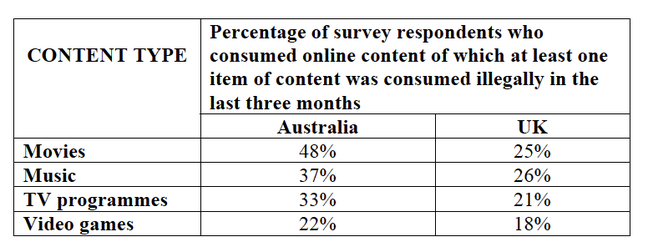This article is more than 1 year old
Pirates also buy content legally, Australian gov study finds
Opposition party wakes up with hangover to find brand-new net filter tattoo on face
As Australia's communications minister Malcolm Turnbull releases a survey designed to help justify the government's Internet not-a- filter legislation, the nation's opposition is showing signs of morning-after regret for waving the laws through parliament.
The law, passed in June, gives content owners a court process by which they can demand blocks or take-downs of allegedly infringing content.
Turnbull today released research that claims 43 per cent of Australians surveyed (or 48 per cent if you read from the table below) had “consumed at least one” content file illegally between March 25 and April 13 this year.

43 per cent, 48 per cent, precision, who needs it?
Image from Malcolm Turnbull media release
The study covered 2,630 respondents and also found that cheaper, more available, and more timely content would get users to mend their wicked, wicked ways.
Only seven per cent of respondents consumed only infringing content, the study found, and (get this for a surprise) "those who consumed 100 per cent of their content illegally spent the least money".
Interestingly, 43 per cent of users “stated that they were not confident of what is legal online content”; presumably those that 'fessed up to watching “illegal” content knew what they were doing.
The survey, conducted by Taylor Nelson Sofries, uses the same methodology as a UK study, which fits the reflexive Anglophilia of Australia's government, its agenda that if site-blocking is working in the Old Country it will also work in Australia and Turnbull's admiration for the work of the UK Government Digital Service.
The Communications Alliance has welcomed the study, and called out a detail inexplicably overlooked in the Turnbull press release:
“It is interesting that almost three quarters of those internet users who consumed content illegally were also accessing content legally”, the alliance notes. “[T]hey were apparently not just looking exclusively for a ‘free ride’, but also were chasing the convenience that comes with ready availability of content”.
That's also supported by spending habits: "those who consumed a mix of legal and illegal content spent more money ... than those who consumed 100 per cent of their content legally".
Australia's main opposition Labor Party, meanwhile, has used “native content” site The Labor Herald (set up so that the party doesn't have to suffer the indignity of journalists monkeying with its “messaging”), Husic writes that the country is being held back by its “draconian” copyright laws.
Those laws, he argues, mean “Australia isn't even considered” as a location for Google data centres, adding that “it's a vivid example of what we're missing out on”.
Desperately trying to outpace the bolted horse, Husic writes that the new Copyright Amendment (Online Infringement) Bill 2015 is “effectively … site-blocking legislation”, and complains that the government (with whom the ALP voted to wave the legislation through) “has refused to comprehensively address concerns” about the bill's effects. ®
